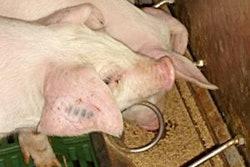
Nutrigenomics, the study of molecular relationships between nutrition and the response of genes is a new approach to improve intestinal health through nutritional means.
It aims to determine the mechanisms behind the effects that nutrients have on health and performance.
Eliminating salmonella naturally
Nutrigenomics attempts to make the beneficial genes work harder and better. For example, it has been found that in case of the intake of colostrum, sialidase mRNA is ‘up regulated’ (Luron 2006).
Sialidase makes holes in the bacterial cell wall. So this may be an explanation of the positive effects of colostrum on health. The challenge is to find out what other compounds may have the same effect. Especially butyric and propionic acid—which are naturally produced by the intestinal flora--seem to play a key role in triggering the expression of beneficial genes or suppressing harmful genes.
In this respect, it has been demonstrated that these acids reduce the invasiveness of salmonella in poultry.
Reduce inflammation
Animals react to pathogenic micro organisms with an immune reaction. However, sometimes this can get out of control resulting in inflammation. This is undesirable because in this state feed intake is reduced and many nutrients are used for the inflammatory reaction and not for production.
There are some ways to reduce inflammation. For example, animal cells can produce IL-10 which leads to suppression of inflammatory processes in the intestine. Nutrigenomic experiments have demonstrated that IL-10 can be ‘upregulated’ by certain compounds.
In this respect polysaccharide A (PSA) that is produced by beneficial intestinal bacteria, induces the production of IL-10 (Round et al. 2009). Nutrigenomic techniques offer the opportunity to find more compounds that temper inflammation.
Antibacterial peptides
The intestinal wall is an active barrier against undesired micro organisms and toxins. In addition to forming a physical barrier, the epithelium is armed with an array of effector molecules, including antimicrobial peptides. These peptides can be considered as endogenous antimicrobials (Shauber et al. 2002). So, the intestine produces these antimicrobial peptides (AMP) for protection against pathogenic bacteria. Examples of AMPs are defensins and cathelicidins.
Figure 1: Antibacterial activity of increasing concentrations
Van Dijk (2007) investigated the role of β-defensins in the digestive tract of chicken and their efficacy.
In this study its antimicrobial activity of chicken β-defensin gallinacin-6 (Gal-6) against foodborne pathogens was investigated. The results are presented in Figure 1. It showed an antimicrobial effect against all pathogens tested.
The mode of action is basically a disruption of the bacterial cell wall. The AMPs may be developed further to peptide antibiotics that can be used for therapeutic or prophylactic applications (Van Dijk et al. 2009).
Propionate boosts antibacterial peptides
Short chain fatty acids (SCFA) like propionate serve as primary substrates for enterocytes. These short chain fatty acids are naturally generated in the intestinal lumen by bacteria that ferment ingested carbohydrates. They exert profound effects on the intestinal function since they affect fluid absorption, proliferation, differentiation, motility and inflammation.
In an experiment, Schauber et al. (2002) showed that propionate increased the expression of LL-37 (an antimicrobial peptide) in intestinal cells. They also showed that propionate increased the differentiation of the enterocytes.
So, induction of these AMPs in the intestine by SCFAs may be an alternative in preventing or treating infections (Schauber et al. 2006). Research is being conducted to optimize the nutrigenomic effects of organic acids boosting antimicrobial peptides in the intestine.
New research technique
Nutrigenomics is a new research technique that offers opportunities to find new anti bacterial and anti-inflammatory concepts. In this respect, organic acids like propionate that are produced naturally by beneficial bacteria in the intestine have been shown to increase the production of antimicrobial peptides in the intestine.
Also, natural polysaccharides have been found to reduce intestinal inflammation. Nutrigenomics is a very promising technique to find more new molecules to improve health and production in farm animals.















